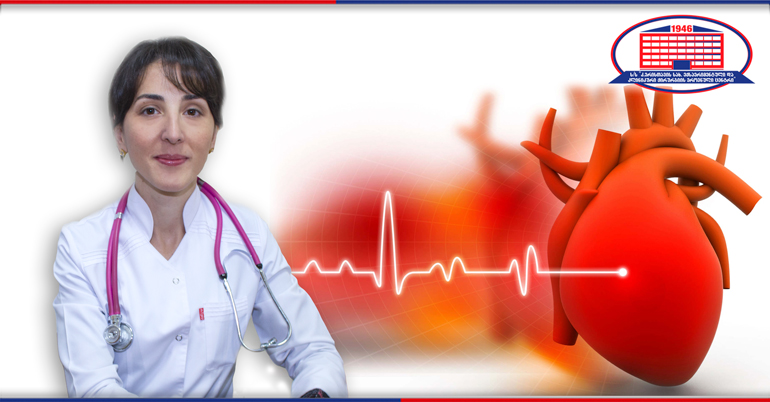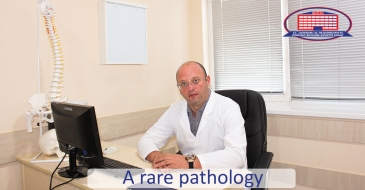
Heart failure is a very common problem in the world, as well as in Georgia.
It develops as a result of the decreased contractile function of the heart. In this case, the heart cannot provide normal perfusion of organs and tissues, adequate metabolic needs in both resting and physical activity states.
In the world, as well as in Georgia, heart failure is a very common problem. It is noteworthy that its frequency increases with age and is one of the most common causes of hospitalization, decreased work productivity and lethality.
Tamar Avaliani, cardiologist of the National Center of Surgery is talking about heart failure.
- What are the symptoms of heart failure?
- Symptoms depend on the type of heart failure, which chambers are involved - left or right, type of dysfunction (systolic or diastolic), the process is acute or chronic. At the initial stage, it may be asymptomatic as a result of the compensatory mechanisms of the body. After some time, despite the presence of these mechanisms, the disease is already showing some symptoms. The earliest complaints are fatigue, shortness of breath, which at first starts during physical activity, and later on, symptoms appear in a resting state. It is characterized by a cough, loss of appetite, rapid heart rate. At the later stage, it is difficult for the patient to lie down and prefers half-sitting position, orthopnea position. It is also characterized by swelling associated with fluid retention, more frequently swelling of the lower extremities, increased night diuretics (nocturia), intensive shortness of breath at night, so-called cardiac asthma.
- Could you please explain what is the difference between acute and chronic heart failures?
- The cause of acute heart failure is acute myocardial infarction, a sudden increase in blood pressure, arrhythmia, pulmonary artery thromboembolism, acute valvular pathology. Left ventricular insufficiency develops more often, which can be clinically manifested with cardiac asthma, pulmonary edema, and cardiogenic shock. During cardiac asthma, the patient suddenly develops shortness of breath, has a feeling of suffocation and breathless while resting, is present in orthopnea (half sitting position). If timely medical assistance is not available, it may end up lethally. As for chronic heart failure, heart diseases, such as myocardial infarction, arterial hypertension, heart diseases, extracardiac causes such as anemia, hypo- or hyperthyroidism, diabetes mellitus, and others, over time increase the progression of the disease and complaints are gradually developing.
- Why does the heart failure develop?
- There are many reasons. It may be due to cardiovascular causes (myocardial infarction, arterial hypertension, heart diseases, myocarditis, cardiomyopathy, pericarditis), or due to extracardiac causes (Anemia, hyper- or hypothyroidism, diabetes mellitus, obesity, chronic obstructive pulmonary disease, renal insufficiency, etc.)
- How do you treat heart failure in the National Center of Surgery?
- The main goal of treatment is to relieve heart failure symptoms, reverse damage to target organs, prolong and improve quality of life. At first, it is necessary to change the lifestyle, which includes weight correction, cholesterol poor diet (limiting saturated fats). Normalizing blood pressure and being physically active (which is individually chosen for each patient) are mandatory. As for medication therapy, diuretics, beta-blockers, ACE inhibitors, glycosides, vasodilators and others are usually used. Medication therapy is selected individually, according to the general condition of the patient, the main disease, and the laboratory or instrumental examinations. For the management of such patients, there are all conditions in our clinic, first of all, highly qualified medical personnel, and high technology studies allow us to diagnose and correctly manage this condition timely and accurately.
- What do you advise our readers to do to prevent heart failure?
- Prevention of heart failure mainly means a change of the lifestyle. It is desirable to lose weight, restrict salt, saturated fats, which are mainly included in meat products (pork, beef or lamb meat), butter, melted butter and some dairy products, for example, sour cream, greasy cheese and trans fats. However, not all kinds of fats are harmful, but some of them are necessary for the body. These are unsaturated fats that are found in the following products: fish, hazelnuts, peanut, sunflower seeds, olive oil and more. It is recommended that you eat frequently but small meals, excluding coffee, strong tea, chocolate, spicy food. The diet should be enriched with fruits, vegetables, seafood. It is mandatory to break bad habits, tobacco or alcohol consumption. Some medications can cause heart failure, such as nonsteroidal anti-inflammatory drugs, antiarrhythmic, and hormone drugs should be taken into consideration. Normalizing blood pressure, managing ischemic heart diseases, correcting anemia and thyroid function, timely and correctly managing diabetes and other diseases will eventually lead to prevention of heart failure. Heart failure is the result of certain pathological processes and it is necessary to have an influence on these processes.
National Center of Surgery address – Tbilisi, Digomi Chachava street N5.
You can contact the Call-center of the National Center of Surgery at 577 11 91 19;
If you have some questions, you can contact the Cardiologist of the National Center of Surgery Tamar Avaliani at 555 57 55 99
Wish you health!
What are patients interested in
coronarography
Qauestion:: My husband had a heart attack in May 2019 as per documents hereto attached and we are now looking for further treatment (either putting another stent or coronary artery bypass surgery (shunting), can you please advise the best focal point to contact to discuss method of treatment – either surgery or putting stent? I am sorry, the case history is in Russian and can be translated upon request. Thank you for your time!
Bradycardia
Qauestion:: I took a heart ultrasound that showed no pathologies. Albeit, I still have issues with my heart. I often feel my heart rate weakening, measured once it can be – 80 and if measured in 10 minutes, it can be 65-70. Can it be a heart pathology or neurosis? And besides ultrasound, is there any examination that detects hidden pathologies of the heart at your clinic and how much does it cost?
Arrhythmia
Qauestion:: Hello, I’m 16 years old and it’s been a month since the onset of following symptoms: a rapid heartbeat, I feel it in my hands, legs, back, as well as in my gastric cardia and I also feel the pulsation in the abdomen after I eat. What can be the cause of these?








